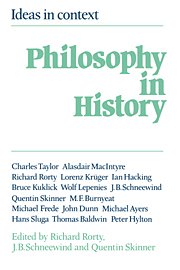Book contents
- Frontmatter
- Contents
- Dedication
- Preface
- Notes on contributors
- Introduction
- PART I
- PART II
- 10 The sceptic in his place and time
- 11 The sceptic's two kinds of assent and the question of the possibility of knowledge
- 12 The concept of “trust” in the politics of John Locke
- 13 Berkeley and Hume: a question of influence
- 14 Frege: the early years
- 15 Moore's rejection of idealism
- 16 The nature of the proposition and the revolt against idealism
- Index
14 - Frege: the early years
Published online by Cambridge University Press: 03 December 2009
- Frontmatter
- Contents
- Dedication
- Preface
- Notes on contributors
- Introduction
- PART I
- PART II
- 10 The sceptic in his place and time
- 11 The sceptic's two kinds of assent and the question of the possibility of knowledge
- 12 The concept of “trust” in the politics of John Locke
- 13 Berkeley and Hume: a question of influence
- 14 Frege: the early years
- 15 Moore's rejection of idealism
- 16 The nature of the proposition and the revolt against idealism
- Index
Summary
Introduction
I, Friedrich Ludwig Gottlob Frege, was born at Wismar on November 8, 1848. My father Alexander, who was principal of a girls' high school there, was taken from me by death in the year 1866. My mother Auguste, née Bialloblotzki, is still alive. I was educated in the Lutheran faith. After attending grammar school in my hometown for fifteen years I graduated from it at Easter 1869 and spent two years at Jena and five semesters at Göttingen on mathematical, physical, chemical, and philosophical studies. In Göttingen I received the Ph.D.
(Frege 1967:84)This short statement, appended to Frege's Habilitationsschrift of 1874, is exceptional in his body of writing for its autobiographical character. Because of Frege's general reticence about himself and because he became famous only decades after his death we no longer possess much information about Frege's life. The statement I have quoted is therefore particularly significant since it draws our attention to Frege's intellectual development before he conceived of his philosophical projects.
My concern here is with that early period of Frege's development. I want to ask what mathematical, scientific, and philosophical ideas he was exposed to and how they shaped the conception and construction of his new logic.
In answering those questions I want to show that Frege developed a conception of the overall organization of human knowledge in the years preceding the Begriffsschrift and that his interest in logic and in the project of the reduction of arithmetic to logic was entirely motivated by that conception.
- Type
- Chapter
- Information
- Philosophy in HistoryEssays in the Historiography of Philosophy, pp. 329 - 356Publisher: Cambridge University PressPrint publication year: 1984
- 7
- Cited by



